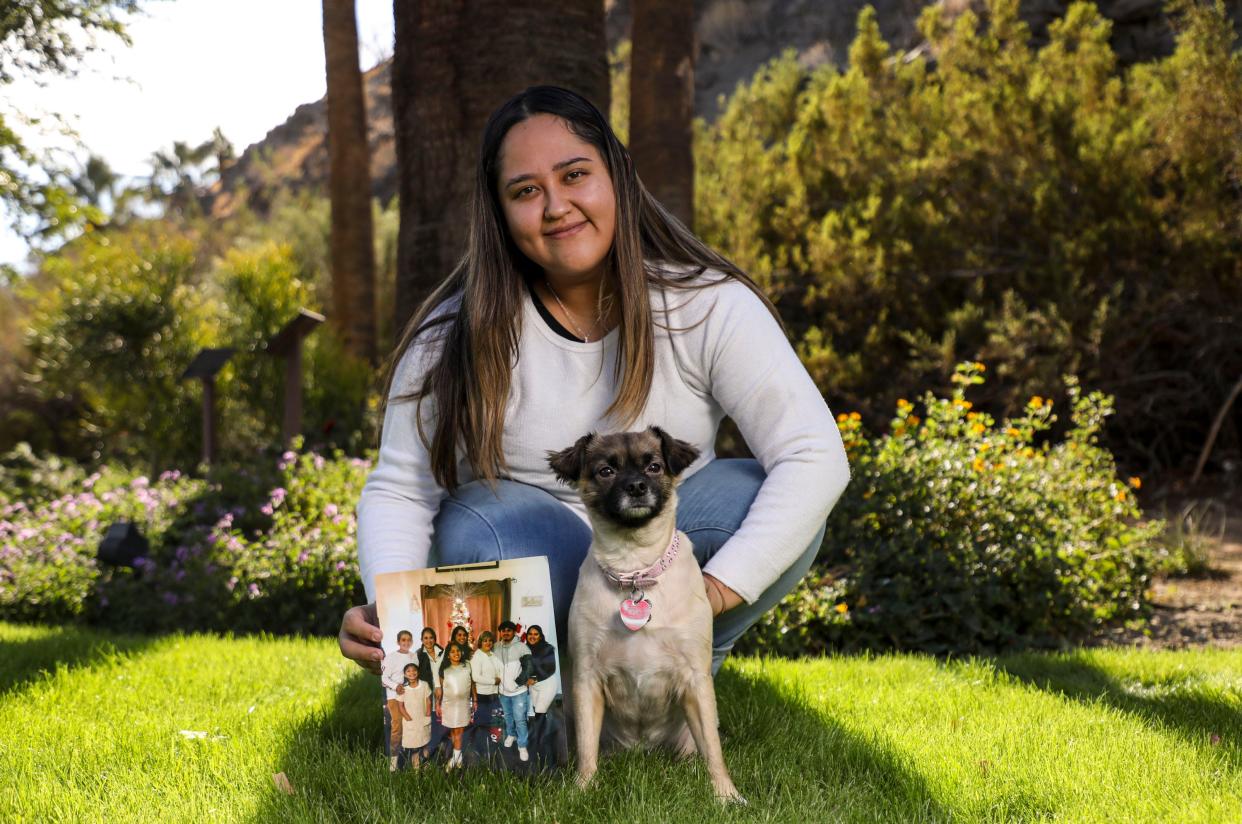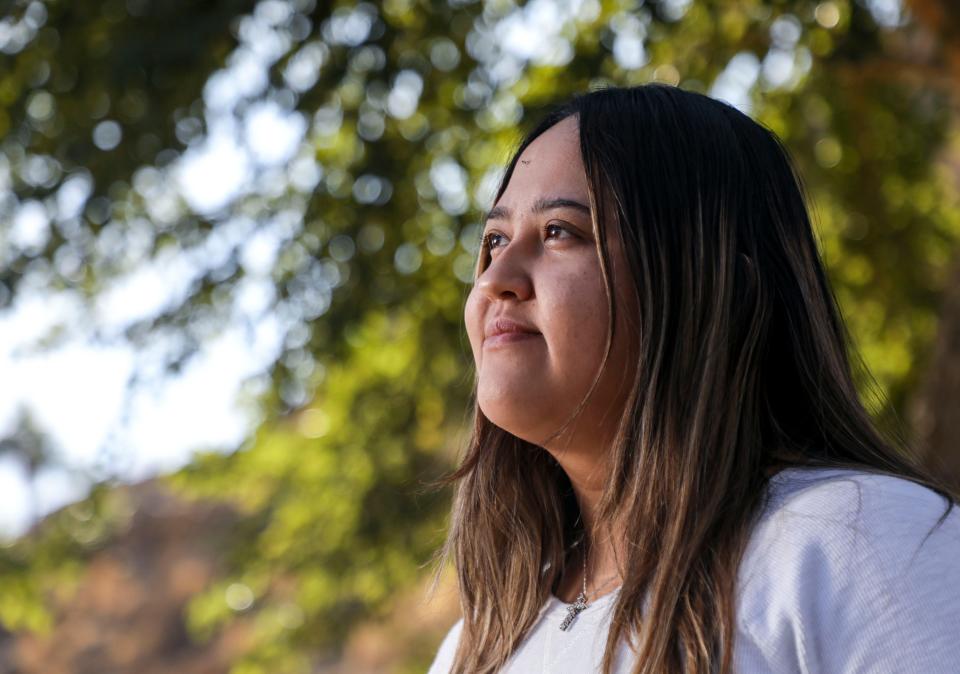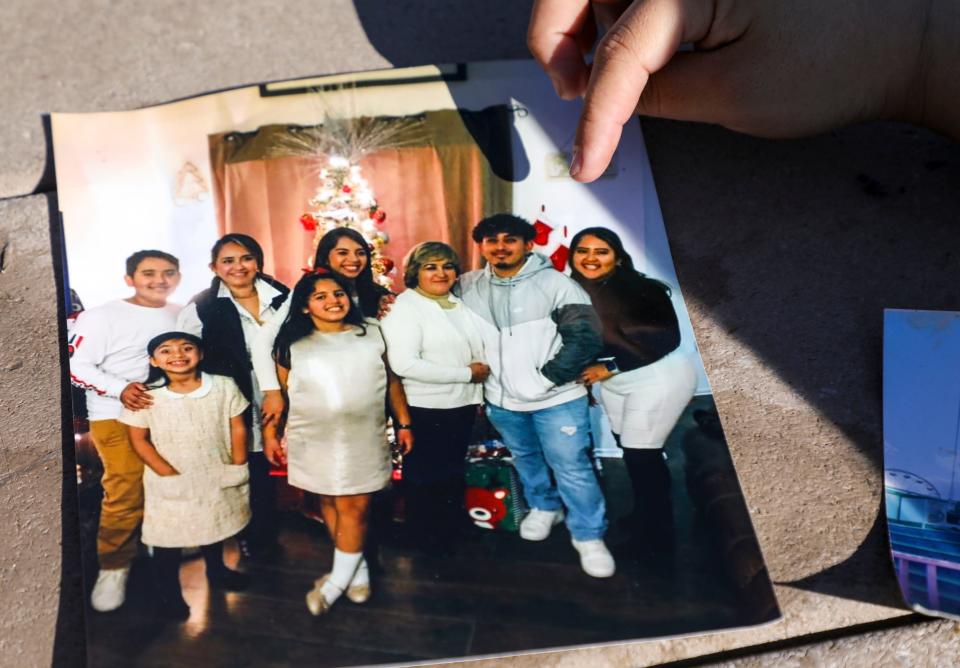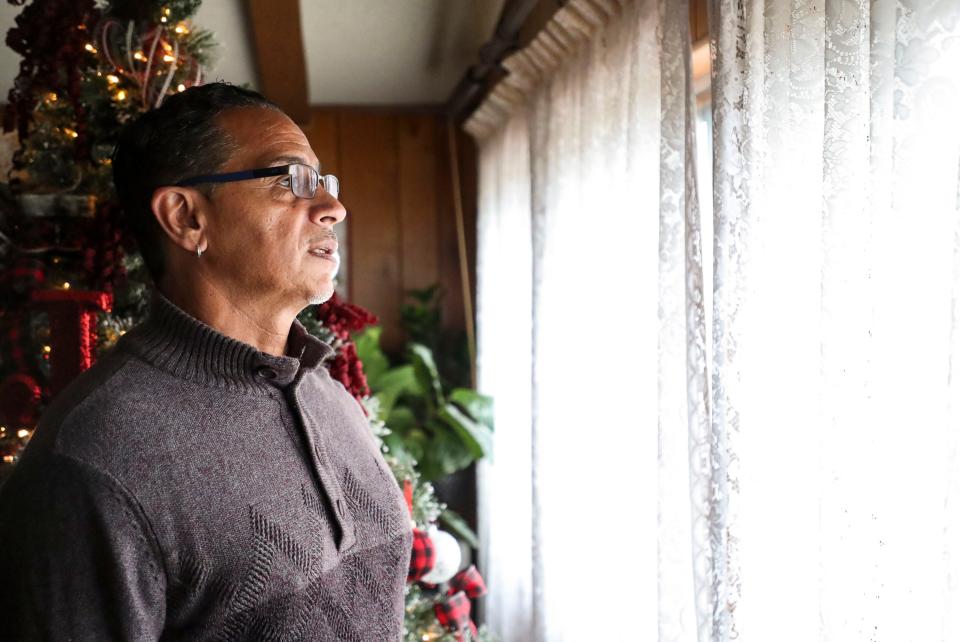Christmas in jail: Palm Desert man struggles with incarceration, his family with his absence

As a Catholic, Maria Lorena Herrera considers Christmas sacred, a season that represents miracles. But as the 2021 holiday approaches, the Palm Desert mother is finding her faith tested.
Her son, Luis Hernandez, is facing a second year's end behind bars.
The 23-year-old is awaiting trial on charges of attempting to kill her. It is a prosecution she doesn't support.
For almost a year after he was arrested, in April 2020, no one could visit Luis Hernandez in jail due to COVID-19 protocols. Pandemic-related court closures slowed down the legal process. Finally, family members were allowed to begin visiting him in the Banning jail for about 45 minutes at a time.
But last week, he was transferred to another Riverside County jail, in Murrieta. That means the visitation trip for Herrera and her daughter Liz Hernandez has almost doubled, to 120 miles round trip.
"I'd love to see him before Christmas, but I don't know if I'll be able to," said Herrera, 54.
She and her daughter fear the effects of isolation during the holidays will take a toll on Luis Hernandez's mental health. After all, they say, it was multiple breakdowns that led to the incident that landed him behind bars in the first place.
"I feel helpless," Liz Hernandez said. "I want him to receive the help he deserves. I want my family to heal. I know there are many others that are going through something similar. That's all we can do is have faith."
A shutdown and a breakdown

When the coronavirus came to California in early 2020 and prompted widespread shutdowns of business, the movie theater in Rancho Mirage where Luis Hernandez worked shuttered. He was laid off. He began struggling with the mundane and melancholy form life had taken while stuck at home.
"I didn't feel like I had a purpose," he said by phone from the Cois M. Byrd Detention Center in Murrieta. "I sometimes think if the pandemic never happened, I wouldn't be here."
COVID-19: Palm Springs wastewater samples continue to detect delta, omicron
Liz Hernandez said the pandemic and the changes it brought to everyday life affected her brother in ways she and her mother didn't realize — until it was too late.
In early April 2020, Luis Hernandez attempted suicide, and was hospitalized for weeks as he recovered. He said he had been struggling with depression for some time but the pandemic made it much harder to manage.
"He transformed into another person," Herrera said in Spanish, her daughter interpreting for her. "He wasn't my son."
When they picked him up from the hospital, Luis Hernandez was given a prescription for medication to help maintain his mental health. Liz Hernandez said she and her mother were given the prescription, which was for medication to treat schizophrenia, but did not speak to the doctor about it or the diagnosis.
"I regret that we didn't realize he needed to take it as badly as he did," Liz Hernandez said. "We were so caught up bringing him home and dealing with what happened, we didn't get it."
After returning from the hospital, Luis Hernandez asked his mother and three sisters to sit with him and talk about what had happened. The way he lost control was new to them, he said, but not to him. It was an explosive but familiar expression of the struggle he had kept bottled up for years.
"I was glad to sit with him, all of us together as a family, and show him we supported him," Herrera said.

Liz Hernandez described the meeting as an intervention. She hoped it would help break down some of the walls that had formed among family members as a result of their busy lives. Those emotional walls had left him feeling alone and desperate.
"It was the last, nice time we had together as a family," Liz Hernandez said of the meeting. "But it didn't last."
Luis Hernandez had another breakdown on April 29, 2020. He was home with his mother and his mind was racing with thoughts that he couldn’t control, Liz said her brother told her later. Luis declined to speak about this event because calls from the jail are monitored by police, but he asked his sister and mother to describe them on his behalf.
Herrera said her son couldn’t sleep and began to spiral out of control. He was speaking irrationally, Herrera said. She tried to calm him, but it didn't work. He grabbed a knife and she tried to stop him from injuring himself, cutting her hand in the process.
John Hall, a spokesperson for the Riverside County District Attorney's Office, said that police received a 911 call saying a woman was yelling for help at what later turned out to be Herrera's home.
When deputies arrived, Hall said, they found Hernandez and his mother in a "physical altercation," and used a Taser on him after he did not comply with their orders.
Both were covered in blood, Hall said. Herrera had a "large laceration to her head and her right index finger was almost completely detached." The DA's office described Luis Hernandez's injures as "minor," adding officers found two bloody knives and glass at the scene.
"We filed the appropriate charges as supported by the evidence provided to us by the investigating agency," Hall said.
Herrera said her memory of what happened next was foggy. When police arrived she told them her son was sick and needed to go to the hospital.
"It was terrifying," Herrera said. "He wanted to hurt himself, and I was trying to stop him."
Support stories like this: Subscribe to Desert Sun today
'It was heartbreaking'
The only trouble with the law Luis Hernandez had been in previously was for traffic violations, county court records show.
So Herrera and her daughter could hardly believe it when they found out that Luis was facing criminal charges.
It was Liz Hernandez who had to break the news that Luis had been charged with the attempted murder of his mother. He was being held on $1 million bail. He faces a potential life sentence if convicted as charged.
Since the family didn’t have the money to post bond, he had no hope of being released until his case was resolved.
"It’s heartbreaking for me, but more so watching my mother," Liz Hernandez said.
Luis Hernandez has pleaded not guilty to the charge by reason of insanity. All such pleas are reviewed by a panel of psychologists to determine if the defendant did not know what they were doing due to their psychological state. Roger Tansey, Luis Hernandez's public defender, said that three psychologists have found Luis met the standard. Still, the prosecution has maintained the charges. Their findings were filed confidentially in the case, and could not be reviewed.
Herrera was interviewed by police in Spanish soon after the altercation. She said she was still in shock and didn't realize what the interviews were ultimately going to be used for.
It took time for Herrera to fully grasp the severity of her son's situation. After seeing his breakdown firsthand, she was focused on his wellbeing. Herrera said she is convinced that he had not intended to attack her but that her injuries were a consequence of her trying to prevent him from hurting himself.
"Everything that happened to me happened because I was trying to save his life," Herrera said. "I never imagined he would go to jail for this."
Constant lockdown
During the first months of incarceration, able to reach his family only occasionally by phone, Luis Hernandez said he was left with the challenge of isolation.
"When you're in a cell, you have to really learn to love yourself and be content," Luis Hernandez told The Desert Sun in a phone interview. "I have to live for God, and my family."
When he was able to phone his family, each call would begin with a required automated message identifying the caller being an "incarcerated individual." That bothered Herrera, who still doesn't think of her son that way.
Opinion: Criminals will decide how big an issue crime will be
"I had to adjust to being in a cell all day, it was like being on lockdown all the time," Luis Hernandez said. "Sometimes I wouldn't be able to make calls, which is important to me. Hearing their voices keeps me going. It gives me hope."
Since Herrera was the victim in the crime that her son was charged with, she was not permitted for months to talk to him in jail. She finally persuaded a judge to allow her to speak with and visit her son. She has also been able to attend court hearings.

About a year before Luis was arrested, he adopted a dog named Luna from a friend. Luna quickly became a member of the family, Liz Hernandez said, adding the dog lives with her "for now" in Palm Springs.
Herrera has brought Luna to most of her son’s court hearings, which the court permits her to do as a service animal. Luna, she said, helps the family cope with Luis' absence, and they try to allow Luis to see her during the hearings, in hope of brightening his day.
Herrera said she's grown to love Luna because her son loved the dog so much.
"They were always together," she said. "He would take her to the park. He tells me to take care of her for him."
Visitation and survival
Michael Jurado knows well the isolation Luis Hernandez is facing. It was a constant in the more than three decades he spent in jails and prisons for violent crimes he committed when he was a young man in Los Angeles in the 1980s, "growing up lost," as he put it.
Jurado was paroled a few years ago and now works with Starting Over Inc., an organization that provides resources to incarcerated people and advocates for criminal justice reform. He works with families navigating the confusion of court hearings and filings, many of whom, like Hernandez, are experiencing incarceration for the first time. Hernandez's family has not worked with Jurado or his organization.

Cultivating and maintaining relationships inside and out of the system was essential to him surviving his decades in custody, Jurado said. He tells families to visit their incarcerated relatives as frequently as possible, saying it's a matter of survival.
"Visiting is essential to rehabilitation for people who are incarcerated," Jurado said. "Depriving them of interaction with their families is depriving them of basic rehabilitation needs.”
The holidays cast a pall over the inmate population, Jurado said. People who already struggle with how to communicate their pain and challenges lash out more, become more combative and aggressive. It’s volatile, he said, fights and suicide increase.
Report: Coachella Valley suicide rate outpaces state, national number
Suicide is more common among those behind bars than among the general public. The rate of death by suicide in state prisons was double that of the general public in 2019, with 27 of every 100,000 state inmates dying of suicide compared to 13.9 among the general public, according to the National Institute of Mental Health. The rate is even higher among inmates in county jails, where 49 of every 100,000 inmates died by suicide that year, according to a study by the Department of Justice.
The study, published in October, found that suicide rates in county jails have increased by about 13% over the last two decades. More than three-quarters of county jail inmates who died by suicide during that period were awaiting trial, the study found.
While he appreciated the contact, Jurado recalled mixed emotions over getting calls from relatives who were having fun during the holidays, celebrating, spending their time together. He remembers stifled conversations awkwardly cut short when a relative on the phone realized that it must have hurt him to hear of festivities on the outside.
Jurado's mother, Diane Acosta, said the pain of her son's absence never went away, even though he was locked up for decades.
"When Michael went through all of this, I was devastated," Acosta said, sitting on her living room couch in Hemet alongside her son as their Christmas tree twinkled with lights. "I didn’t know what to do or where to turn. The problem is mothers don’t have someone in the legal system to talk to them. You feel lost all the time."
After Jurado was released on parole in 2017, he landed back in trouble about eight months later.
While Jurado was litigating the issue with his parole in 2018, Acosta had put up the family's Christmas tree. By the time Jurado was sentenced to an additional term, he would ultimately spend 14 months inside, she couldn't get herself to take the tree down.
"I wanted him to see it when he came home, to let him sit down and open his gifts," Acosta said.
And she did, when Jurado was released again in July 2019, the tree was still standing. He came home and opened the gifts.
A fear of deportation

Luis Hernandez is scheduled to start his trial on Jan. 3 but his defense attorney said it will likely be delayed.
The stakes go beyond the potential life sentence he could face if convicted. Luis is one of 800,000 or so people brought unlawfully to the United States as a child, who qualified for the Deferred Action for Childhood Arrivals program. The policy does not grant them official legal status or a pathway to citizenship but lets people such as Luis apply for a driver’s license, social security number, and work permit.
The charges have put Luis' DACA status in question. If he is convicted, he could be deported to Mexico, a country he hardly knows.
"If that happens, I'll probably never see him again," Liz Hernandez said.
She said that the family is resigned to another Christmas without Luis. He will most likely spend his birthday in early January in jail too.
If she is able to, she'll go visit her brother in Murrieta. Over time, they have developed a ritual of praying at the end of their sessions.
As the weeks have turned into months, they don’t always remember whose turn it is to lead.
Before they join in addressing the divinity they both find comfort in, Liz Hernandez said, they always ask each other through the glass: “Who is gonna pray us out?"
Christopher Damien covers public safety and the criminal justice system. He can be reached at christopher.damien@desertsun.com or follow him at @chris_a_damien.
This article originally appeared on Palm Springs Desert Sun: Christmas in jail: Palm Desert family struggles with holiday separation

